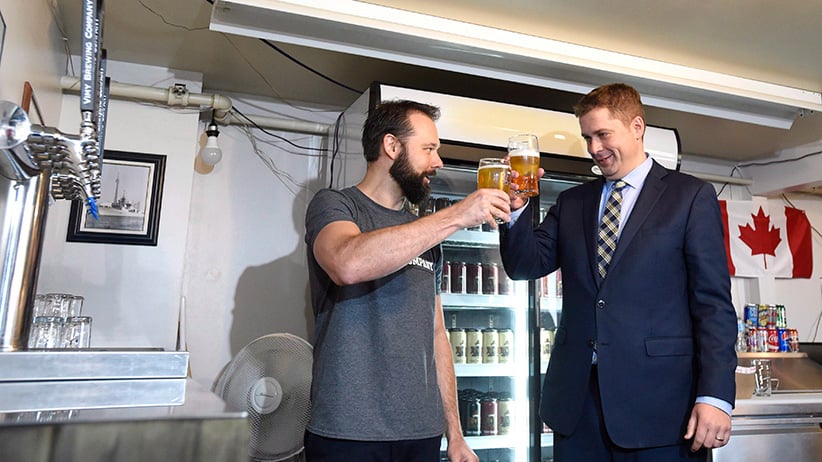Andrew Scheer’s Everyman image won’t be enough to beat Justin Trudeau
Any strategy that amounts to Scheer trying to go head-to-head with Trudeau is doomed, experts say
Conservative Party Leader Andrew Scheer and Michael Sirko, left, co-founder of the Vimy Brewing Company, clink beer glasses during a photo opportunity before a press conference launching the Save Local Business campaign in response to the government’s tax changes for small businesses, at Vimy Brewing Company in Ottawa on Tuesday, Sept. 19, 2017. (Justin Tang/CP)
Share

Andrew Scheer leaves no room for doubt about how he hopes Canadian voters see him. On the night of his upset win last spring in the Conservative leadership race, Scheer derided Justin Trudeau’s Liberals as a club for “connected Ottawa insiders,” while touting his Tories as the party of, quite simply, “taxpayers.” More recently, in a party video in which he strolls along a path by a suburban playground, he scoffs at Liberals for “taking their cues from the cocktail circuit,” while declaring that he’s attuned to “grocery stores and soccer fields.”
READ: Andrew Scheer of the suburbs vs Justin Trudeau and his throngs
His anti-elitist rhetoric felt relevant through most of the fall of 2017. The serial stumbles of multi-millionaire Finance Minister Bill Morneau—first on small-business tax reform and then on conflict-of-interest questions—played neatly into Scheer’s narrative about Trudeau’s Liberals being dominated by out-of-touch rich guys. Yet not all Conservatives are confident Scheer can count on his I’m-more-like-you theme to carry him through 2018, as he tries to consolidate his relatable image in the run-up to the 2019 election.
Michele Austin, a senior adviser at the Ottawa-based consulting firm Summa Strategies and a former chief of staff to two cabinet ministers in Stephen Harper’s government, says any strategy that amounts to Scheer trying to go head-to-head with Trudeau is doomed. “I haven’t seen any numbers on Justin Trudeau that say, ‘Oh, there’s a weakness here we can take advantage of,’ ” she says. “There are [Liberal] caucus weaknesses, there are policy weaknesses, there are regional weaknesses. But if you’re running against Justin Trudeau, that’s a fool’s errand.”
Austin argues that Conservative strategy must shift away from broadly asking voters to pick between Trudeau and Scheer and instead target clusters of ridings and demographic segments that detailed voter research shows might be primed to shift away from the Liberals. Pollster Shachi Kurl, executive director of the Angus Reid Institute, says polls show that Trudeau’s persona remains potent, and that it defines the Liberal brand for many voters. That might offer Scheer an opening to take more of a team approach, she suggests, although any party strategy that’s not focused tightly on the leader would be a rarity in Canadian federal politics.
Kurl says Scheer’s starting point is that he can rely on about 20 per cent of voters sticking with his Conservatives, with another 20 per cent open to being persuaded. The problem is that the loyal base mostly responds to messages about smaller government and lower taxes, but those willing to be courted often want to hear messages about government doing new things. “The big issue for Scheer is he’s got to keep the base fed and watered and happy, but he’s also got to grow that base,” Kurl says.
One model for expanding Conservative support will be tested on a large scale in Ontario in 2018, where voters are set go to the polls in a June 7 provincial election. In his bid to unseat Premier Kathleen Wynne’s Liberals, Ontario Conservative Leader Patrick Brown, a former federal MP, has tacked to the centre on a few highly symbolic issues. “Imagine Brown wins,” says a senior Conservative who asked not to be named. “Then a lot of people, certainly around Toronto in the old Red Tory crowd, will say, ‘Patrick marched in the Pride parade and said yes to a carbon tax, and he won. So, what’s your plan, Andrew?’ ”
In fact, Scheer resolutely avoided hot-button issues during his patient, quiet, come-from-behind campaign for the federal party leadership. He hasn’t shown any hint of willingness to risk alienating diehards, as Brown has on gay Pride and climate change policy. Instead, Scheer’s top aides say he is determined to keep the focus on managing the economy. There’s little dissent among Tories on that score. They revelled as Morneau’s woes on small-business taxes dominated debate through much of the summer and fall of 2017. “Conservatives win when the ballot question is around economic policy and tax policy,” says that senior Conservative.
Still, Scheer can’t expect the Liberals to keep giving him gifts as valuable as the small-business tax fiasco. The 2018 economic picture is shaping up well for the Liberals, with growth strong and the federal deficit coming in lower than projected. That could leave Scheer searching for other issues on which to score points. Another surge in refugees crossing into Canada from the U.S.? Rough patches on the road to marijuana legalization? Which issues he highlights could depend on what he picks up from soccer sidelines and grocery-store aisles.
MORE ABOUT ANDREW SCHEER:
- McKenna hopes ‘climate Barbie’ furor brings change in behaviour
- Hyper parliamentarians are back in the House of Commons
- Parliament returns, and it’s a bit of a mess
- Conservatives plot party strategy at caucus retreat
- Andrew Scheer set to rally his side at Conservative caucus meeting
- It’s time for Conservatives to ditch dairy cow Marxism